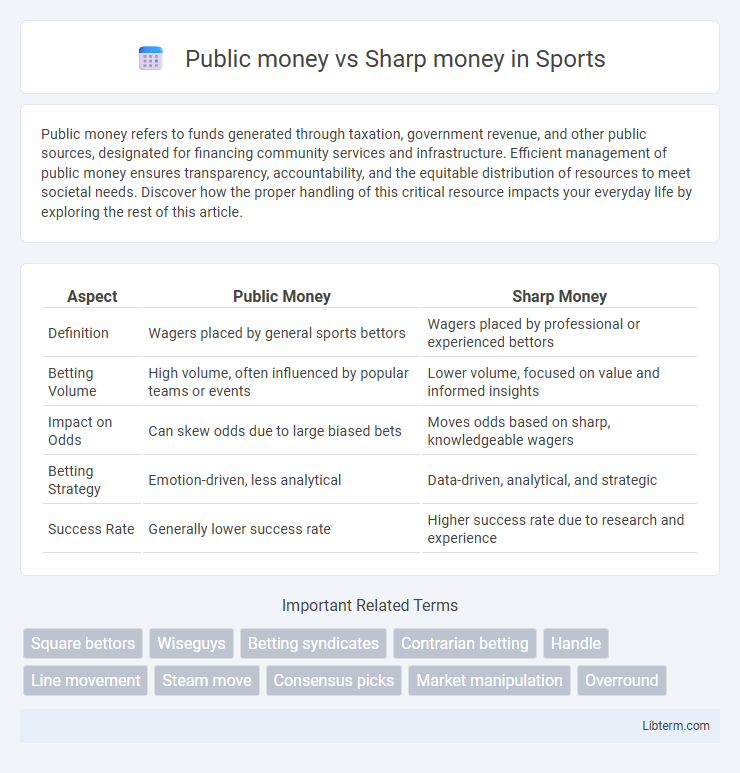Public money refers to funds generated through taxation, government revenue, and other public sources, designated for financing community services and infrastructure. Efficient management of public money ensures transparency, accountability, and the equitable distribution of resources to meet societal needs. Discover how the proper handling of this critical resource impacts your everyday life by exploring the rest of this article.
Table of Comparison
| Aspect | Public Money | Sharp Money |
|---|---|---|
| Definition | Wagers placed by general sports bettors | Wagers placed by professional or experienced bettors |
| Betting Volume | High volume, often influenced by popular teams or events | Lower volume, focused on value and informed insights |
| Impact on Odds | Can skew odds due to large biased bets | Moves odds based on sharp, knowledgeable wagers |
| Betting Strategy | Emotion-driven, less analytical | Data-driven, analytical, and strategic |
| Success Rate | Generally lower success rate | Higher success rate due to research and experience |
Understanding Public Money and Sharp Money
Public money refers to funds wagered by casual bettors or the general public, often driven by emotions and less informed analysis, while sharp money denotes bets placed by professional and experienced bettors who utilize detailed statistical models and insider information. Understanding the distinction between public money and sharp money helps identify market trends, as sharp money typically moves lines more significantly due to its informed nature, whereas public money can create temporary inefficiencies. Monitoring the flow of sharp money enables bettors to exploit value bets and improve their chances of success in sports betting markets.
Key Differences Between Public Money and Sharp Money
Public money refers to funds wagered by casual or recreational bettors, often less experienced and influenced by popular opinion, while sharp money comes from professional or highly skilled bettors with extensive research and insider knowledge. Sharp money is characterized by strategic betting patterns, such as early line moves or large bets on underdogs, signaling informed decisions that can affect odds more significantly than public money. Key differences include the impact on betting markets, risk tolerance, and the sources and reliability of information used by each group.
How Public Money Influences Betting Markets
Public money in betting markets typically represents high-volume bets from recreational bettors, often on popular teams or outcomes, which can skew odds and create inefficiencies. Sharp money, in contrast, comes from professional bettors using advanced analytics and information to exploit these inefficiencies, often driving odds towards more accurate reflections of true probabilities. The influence of public money can lead to overvalued favorites, offering sharps opportunities to capitalize on inflated lines and potentially achieve higher returns.
The Role of Sharp Money in Sports Betting
Sharp money represents bets placed by professional, well-informed bettors who analyze detailed statistics and market trends, driving significant fluctuations in sports betting odds. Its role is critical in identifying value bets and influencing sportsbooks to adjust lines to manage risk effectively. Public money, typically from recreational bettors, is less informed, often leading sportsbooks to favor sharp money insights when setting odds to ensure balanced books and profitability.
Identifying Public vs Sharp Bettors
Public money typically represents bets placed by casual bettors who follow popular trends and media tips, often favoring well-known teams or players. Sharp money consists of wagers made by professional or experienced bettors who analyze odds, statistics, and value bets to exploit market inefficiencies. Identifying public bettors involves tracking increased betting volume on favorites and mainstream events, while sharp bettors can be recognized by sudden line movements and bets placed against public sentiment.
Impact on Odds: Public vs Sharp Money
Sharp money often moves the betting lines significantly due to its informed nature, reflecting expert analysis and insider knowledge, which sharp bettors use to exploit inefficiencies. Public money tends to be less predictive and can cause odds to shift irrationally, often leading to inflated betting lines on popular teams or outcomes. Understanding the impact of sharp money on odds helps bettors identify value and avoid the biases created by public betting trends.
Why Sharp Money Often Beats the Market
Sharp money consistently beats the market due to its reliance on expert analysis, sophisticated algorithms, and real-time data, enabling precise and timely decisions. Unlike public money driven by emotional reactions and herd behavior, sharp money leverages advanced quantitative models and insider information to exploit market inefficiencies. This informed approach allows sharp investors to capitalize on opportunities that the broader public market often misses, resulting in superior returns.
Bookmakers’ Response to Sharp and Public Money
Bookmakers adjust their odds dynamically in response to sharp money, which typically represents informed bettors with high accuracy, to minimize risk and balance their books. Public money, driven by casual or recreational bettors, often leads to more volatile market movements, prompting bookmakers to exploit public biases by setting less favorable lines. This strategic differentiation helps bookmakers maintain profitability by attracting public bets while limiting exposure to sharp money.
Strategies for Betting with Public and Sharp Money Insights
Public money typically comes from recreational bettors who follow popular trends, often leading to inflated odds on highly publicized teams. Sharp money originates from professional or expert bettors employing sophisticated analysis and information advantages, resulting in more precise wagers. Effective betting strategies involve fading the public money by targeting undervalued odds favored by sharps and closely monitoring line movements to identify where sharp money circulates for optimal value bets.
Common Misconceptions About Public and Sharp Money
Many bettors mistakenly believe public money always represents uninformed or emotional bets, while sharp money is invariably wise and well-researched. In reality, public money often drives market movement and can indicate valuable trends, whereas sharp money sometimes aims to exploit public misconceptions rather than being purely expert insight. Misjudging these distinctions can lead to flawed betting strategies and missed opportunities.
Public money Infographic

 libterm.com
libterm.com